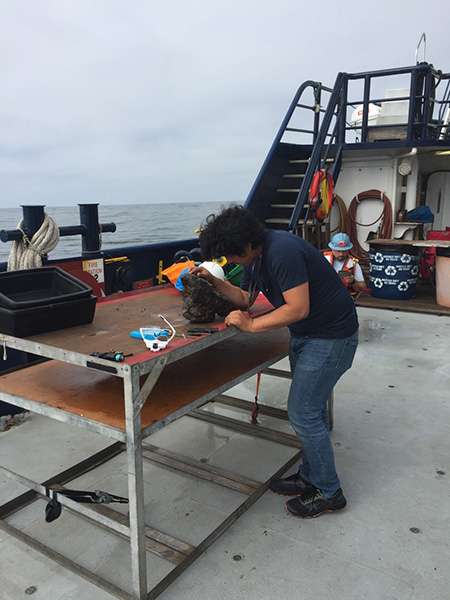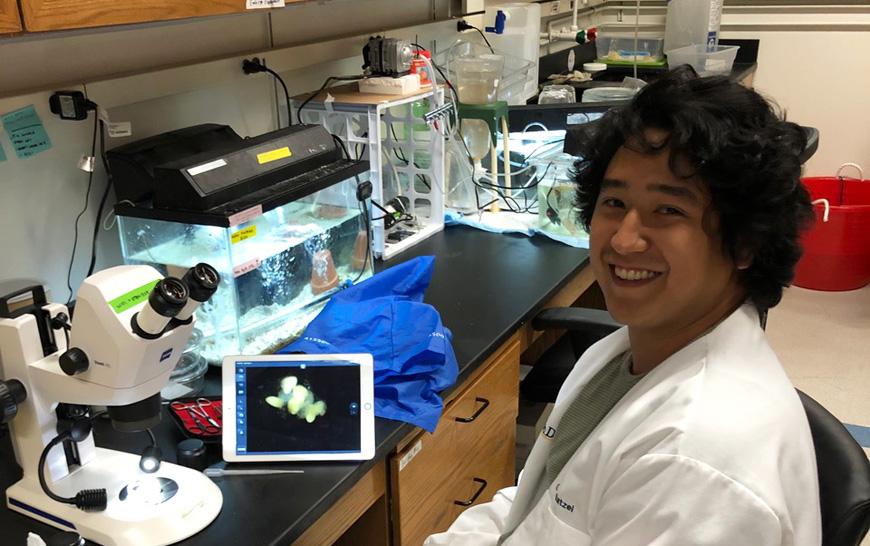Grant Batzel is a third-year PhD student majoring in marine biology at Scripps Institution of Oceanography at the University of California San Diego. His field of study is developmental biology and he is being advised by Scripps scientist Deirdre Lyons. Batzel grew up in Chicago but spent some time on the East Coast before attending the University of Hawaii at Manoa to study marine biology and minor in anthropology.
explorations now: Why did you choose to attend Scripps to pursue a PhD?
Grant Batzel: “Shore-based laboratory with access to flowing seawater.” Say that to any marine biologist and they will pack their bags in a matter of seconds.
I culture marine organisms that require seawater. While it is possible to make artificial seawater, having access to seawater from the coast is even more convenient. Also, proximity to the ocean means I can go out and collect different critters from the shore and bring them back to the lab to study.
en: What are you researching at Scripps and how did you become interested in this field?
GB: In Hawaii, I worked in a lab that studied metamorphosis in marine invertebrates, which is an important life-history period where some marine invertebrates transition from swimming larvae to benthic adults. I spent a day out of the month at the lab’s testing site in Pearl Harbor, taking pictures of surfaces that had been submerged in seawater. I began to notice that many of the marine organisms that grew on these surfaces also produced calcified structures. As such, it got me wondering how calcareous structures are formed and how they first evolved. Calcareous structures are things like shells, tubes, and skeletons produced by animals—basically anything composed of calcium carbonate.
I now study the slipper snail, Crepidula fornicata, and the underlying molecular mechanisms that control shell formation during development. One of the defining characteristics of shells is their ability to withstand high levels of mechanical stress. This is due to proteins in the shell, which increases the shell strength and protects the animal from being crushed. In addition to shell proteins, I study genes called “transcription factors” which regulate the expression of shell proteins. We are working to microinject a Cas9 enzyme and a single-guide RNA into an embryo to target the deletion of shell matrix proteins in Crepidula. If we are successful, then we anticipate finding altered shell morphology or even absence of a larval shell.
en: What’s life like as a Scripps student? Describe a typical day.
GB: When I get to Scripps in the morning, I usually stop by the experimental aquarium facility at Hubbs Hall to look at critters in the seawater tables. Seawater tables are shallow troughs that are raised up on legs, that marine animals can be kept in. Seawater is continuously being pumped in from the pier and some of that water is diverted to the seawater tables in Hubbs. I’m usually on the lookout for animals that I am unfamiliar with or embryos that are laid on the side of the tanks that I then bring up to the lab to look at under the microscope. When I’ve identified whatever it is that I’m looking at, I’ll usually go to my office and check emails before beginning work. This past year, I spent a lot of time at my computer working on and learning about bioinformatics: the use of statistics, data science, and computer science to understand questions in biology. When I need a break, I’ll walk down to the Scripps pier and look for animals in the sea flumes. On particularly stressful days, I’ll walk to the tidepools just up the shore to clear my head.
en: What’s the most exciting thing about your work?
GB: The first thing that comes to mind is discovering something new. Whether it’s after the end of an intense five-day experiment and I have exciting data to show my advisor Deirdre Lyons, or if it’s bringing an animal back from the tidepools and discovering what might be a new species—a little lightbulb goes off in my head and it motivates me to keep going.







修改评论